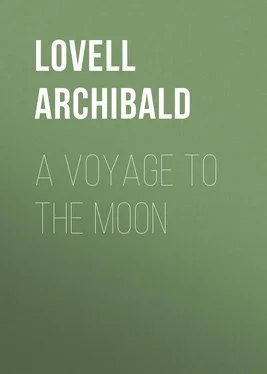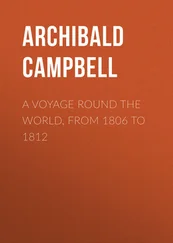Archibald Lovell - A Voyage to the Moon
Здесь есть возможность читать онлайн «Archibald Lovell - A Voyage to the Moon» — ознакомительный отрывок электронной книги совершенно бесплатно, а после прочтения отрывка купить полную версию. В некоторых случаях можно слушать аудио, скачать через торрент в формате fb2 и присутствует краткое содержание. Жанр: foreign_antique, foreign_prose, на английском языке. Описание произведения, (предисловие) а так же отзывы посетителей доступны на портале библиотеки ЛибКат.
- Название:A Voyage to the Moon
- Автор:
- Жанр:
- Год:неизвестен
- ISBN:нет данных
- Рейтинг книги:5 / 5. Голосов: 1
-
Избранное:Добавить в избранное
- Отзывы:
-
Ваша оценка:
- 100
- 1
- 2
- 3
- 4
- 5
A Voyage to the Moon: краткое содержание, описание и аннотация
Предлагаем к чтению аннотацию, описание, краткое содержание или предисловие (зависит от того, что написал сам автор книги «A Voyage to the Moon»). Если вы не нашли необходимую информацию о книге — напишите в комментариях, мы постараемся отыскать её.
A Voyage to the Moon — читать онлайн ознакомительный отрывок
Ниже представлен текст книги, разбитый по страницам. Система сохранения места последней прочитанной страницы, позволяет с удобством читать онлайн бесплатно книгу «A Voyage to the Moon», без необходимости каждый раз заново искать на чём Вы остановились. Поставьте закладку, и сможете в любой момент перейти на страницу, на которой закончили чтение.
Интервал:
Закладка:
Now as to the Worlds, which, with Analogy to ours below, I may call the Old and New; that of the Moon having been discovered, tho imperfectly, by others, but the Sun owing its Discovery wholly to our Author: 2 2 Among the "others" who had previously "discovered" the Moon, Ariosto is the most prominent. In his Orlando Furioso , Astolfo goes to the moon, visits the "Valley of Lost Things," finds there many broken resolutions, idlers' days, lovers' tears, and other such matters; and finally recovers Orlando's lost wits, which he brings back to the earth. The Satire Ménippée (1594) gives, in its Supplément , "News from the Regions of the Moon." Quevedo, the Spanish satirist and novelist (1580-1645), with whose works Cyrano was acquainted, also gives an account of the moon in his Sixth Vision. In England, the Rev. John Wilkins (1614-1672), once Principal of Trinity College, Cambridge, and later Bishop of Chester, a brother-in-law of Cromwell, and one of the founders of the Royal Society, published in 1638 the " Discovery of a New World ; or, a Discourse to prove it is probable there may be another habitable world in the Moon; with a discourse concerning the possibility of a passage thither "; and later, in 1640, the " Discourse concerning a new Planet; tending to prove it is probable our earth is one of the Planets." These two works are said to have done more than any others to popularize the Copernican system in England. The Discovery of a New World was translated into French by Jean de Montagne, and published at Rouen in 1655 or 1656. See Charles Nodier, Mélanges extraits d'une petite bibliothèque . Finally, the most important of Cyrano's predecessors in the discovery of the moon was Francis Godwin, M.A., D.D., Bishop of Llandaff and later of Hereford (1562-1633). It was not till 1638, after the worthy Bishop's death, and in the same year that Rev. (later Bishop) John Wilkins' Discovery of a New World was published, that there appeared his " Man in the Moone ; or a Discourse of a Voyage Thither, by Domingo Gonsales, the Speedy Messenger." This was translated into French by Jean Baudoin or Baudouin in 1648, as "L'homme dans la lune … voyage … fait par Dominique Gonzales, aventurier espagnol," and was well known to Cyrano, as we shall see. In saying that "the sun owes its discovery wholly to our author," the translator appears to be ignorant of a work which Cyrano certainly knew: the Civitas solis of Campanella, published in 1623 as a part of his Realis Philosophiæ Epilogisticæ Partes IV .
I make no doubt, but the Ingenious Reader will find in both, so extraordinary and surprizing Rarities, as well Natural, Moral, as Civil; that if he be not as yet sufficiently disgusted with this lower World, (which I am sure some are) to think of making a Voyage thither, as our Author has done; he will at least be pleased with his Relations. Nevertheless, since this Age produces a great many bold Wits, that shoot even beyond the Moon, and cannot endure, (no more than our Author) to be stinted by Magisterial Authority, and to believe nothing but what Gray-headed Antiquity gives them leave: It's pity some soaring Virtuoso, instead of Travelling into France, does not take a flight up to the Sun; and by new Observations supply the defects of its History; occasioned not by the Negligence of our Witty French Author, but by the accursed Plagiary of some rude Hand, that in his Sickness, rifted his Trunks, and stole his Papers, as he himself complains. 3 3 Cf. the last sentence of the Voyage to the Moon .
Let some venturous Undertaker auspiciously attempt it then; and if neither of the two Universities, Gresham-College, nor Greenwich-Observatory can furnish him with an Instrument of Conveyance; let him try his own Invention, or make use of our Author's Machine: For our Loss is, indeed, so great, that one would think, none but the declared Enemy of Mankind, would have had the Malice, to purloyn and stiffle those rare Discoveries, which our Author made in the Province of the Solar Philosophers; and which undoubtedly would have gone far, as to the settleing our Sublunary Philosophy, which, as well as Religion, is lamentably rent by Sects and Whimseys; and have convinced us, perhaps, that in our present Doubts and Perplexities, a little more, or a little less of either, would better serve our Turns, and more content our Minds.
CHAPTER I.
Of how the Voyage was Conceived
I Had been with some Friends at Clamard, a House near Paris, and magnificently Entertain'd there by Monsieur de Cuigy, 4 4 Monsieur de Cuigy, who is mentioned by Lebret as a friend and admirer of Cyrano, and who was one of the witnesses of his famous battle against the hundred ruffians, possessed an estate at Clamart-sous-Meudon, near Paris. He appears as a character in M. Rostand's play of Cyrano de Bergerac .
the Lord of it; when upon our return home, about Nine of the Clock at Night, the Air serene, and the Moon in the Full, the Contemplation of that bright Luminary furnished us with such variety of Thoughts as made the way seem shorter than, indeed, it was. Our Eyes being fixed upon that stately Planet, every one spoke what he thought of it: One would needs have it be a Garret Window of Heaven; another presently affirmed, That it was the Pan whereupon Diana smoothed Apollo's Bands; whilst another was of Opinion, That it might very well be the Sun himself, who putting his Locks up under his Cap at Night, peeped through a hole to observe what was doing in the World during his absence.
"And for my part, Gentlemen," said I, "that I may put in for a share, and guess with the rest; not to amuse my self with those curious Notions wherewith you tickle and spur on slow-paced Time; I believe, that the Moon is a World like ours, to which this of ours serves likewise for a Moon."
This was received with the general Laughter of the Company. "And perhaps," said I, "(Gentlemen) just so they laugh now in the Moon, at some who maintain, That this Globe, where we are, is a World." But I'd as good have said nothing, as have alledged to them, That a great many Learned Men had been of the same Opinion; for that only made them laugh the faster.
However, this thought, which because of its boldness suited my Humor, being confirmed by Contradiction, sunk so deep into my mind, that during the rest of the way I was big with Definitions of the Moon which I could not be delivered of: Insomuch that by striving to verifie this Comical Fancy by Reasons of appearing weight, I had almost perswaded my self already of the truth on't; when a Miracle, Accident, Providence, Fortune, or what, perhaps, some may call Vision, others Fiction, Whimsey, or (if you will) Folly, furnished me with an occasion that engaged me into this Discourse. Being come home, I went up into my Closet, where I found a Book open upon the Table, which I had not put there. It was a piece of Cardanus 5 5 Jerome Cardan, 1501-1576, natural philosopher, doctor, astrologer, mathematician, and a voluminous author; in short, a sort of Italian Paracelsus, both by his universal learning, and by his intense interest in all domains of possible knowledge, in which he included astrology and necromancy. His most important work is the one referred to here, the De Subtilitate Rerum , 1551.
; and though I had no design to read in it, yet I fell at first sight, as by force, exactly upon a Passage of that Philosopher where he tells us, That Studying one evening by Candle-light, he perceived Two tall old Men enter in through the door that was shut, who after many questions that he put to them, made him answer, That they were Inhabitants of the Moon, and thereupon immediately disappeared.
I was so surprised, not only to see a Book get thither of it self; but also because of the nicking of the Time so patly, and of the Page at which it lay upon, that I looked upon that Concatenation of Accidents as a Revelation, discovering to Mortals that the Moon is a World. "How!" said I to my self, having just now talked of a thing, can a Book, which perhaps is the only Book in the World that treats of that matter so particularly, fly down from the Shelf upon my Table; become capable of Reason, in opening so exactly at the place of so strange an adventure; force my Eyes in a manner to look upon it, and then to suggest to my fancy the Reflexions, and to my Will the Designs which I hatch.
Читать дальшеИнтервал:
Закладка:
Похожие книги на «A Voyage to the Moon»
Представляем Вашему вниманию похожие книги на «A Voyage to the Moon» списком для выбора. Мы отобрали схожую по названию и смыслу литературу в надежде предоставить читателям больше вариантов отыскать новые, интересные, ещё непрочитанные произведения.
Обсуждение, отзывы о книге «A Voyage to the Moon» и просто собственные мнения читателей. Оставьте ваши комментарии, напишите, что Вы думаете о произведении, его смысле или главных героях. Укажите что конкретно понравилось, а что нет, и почему Вы так считаете.












